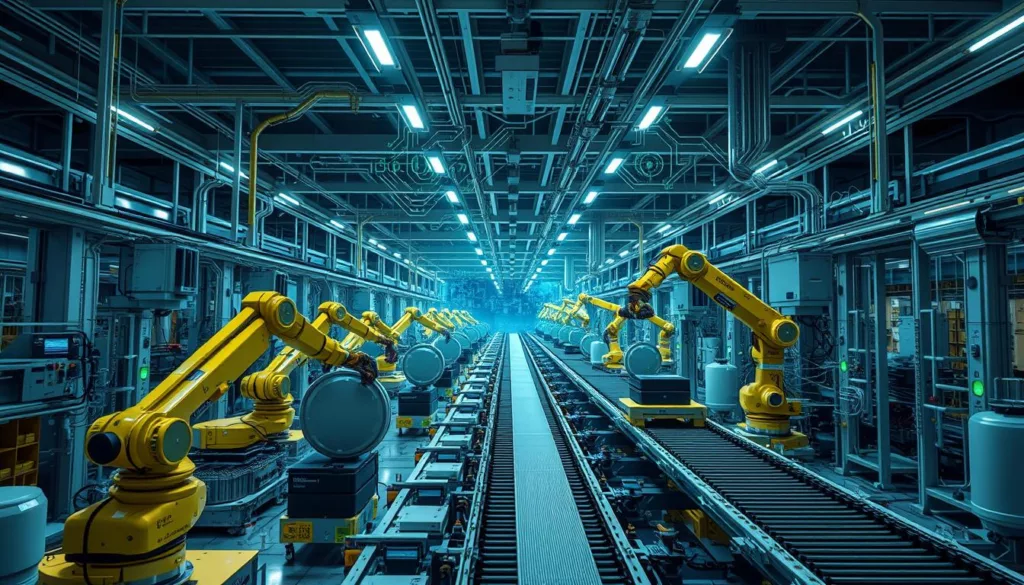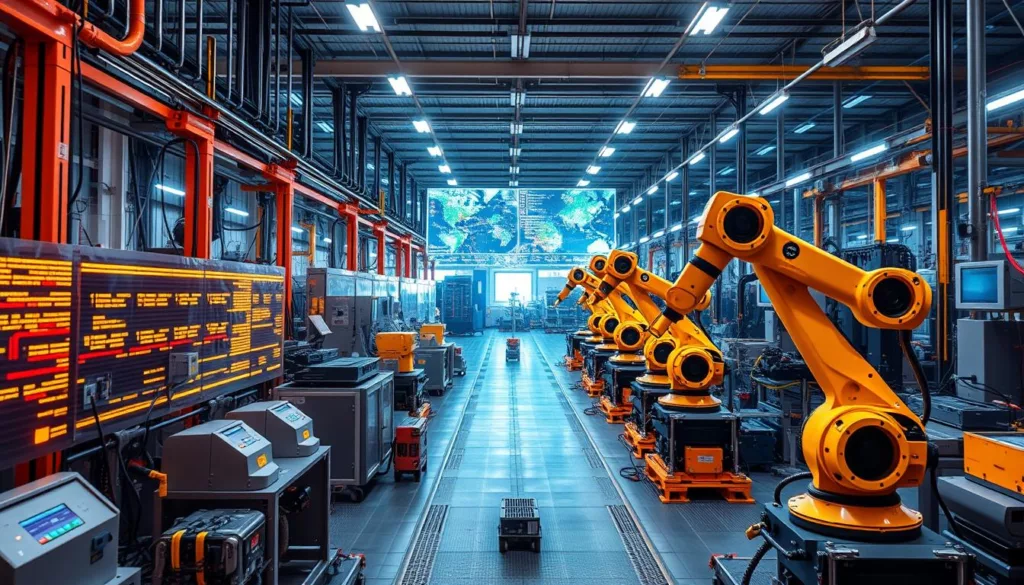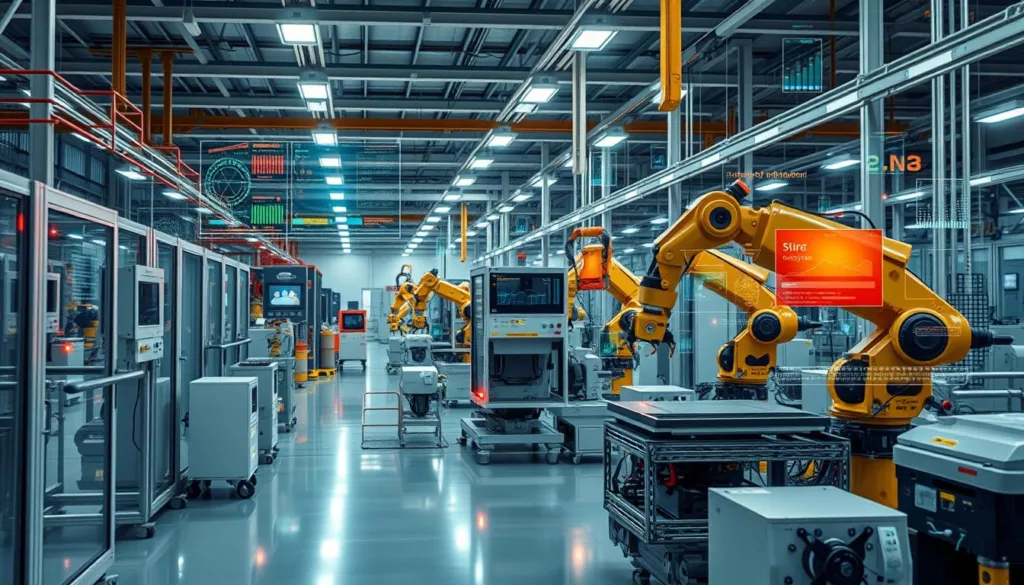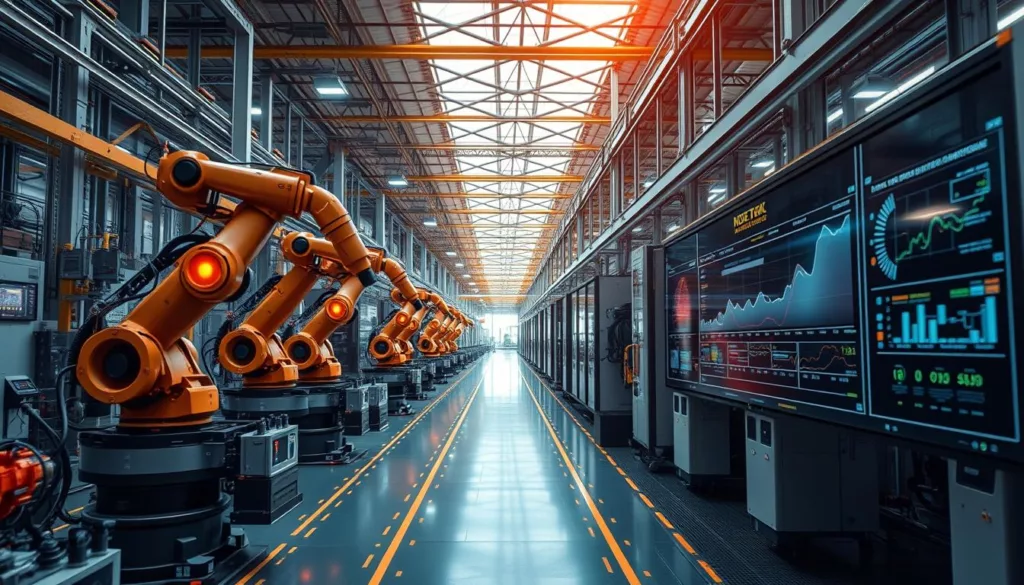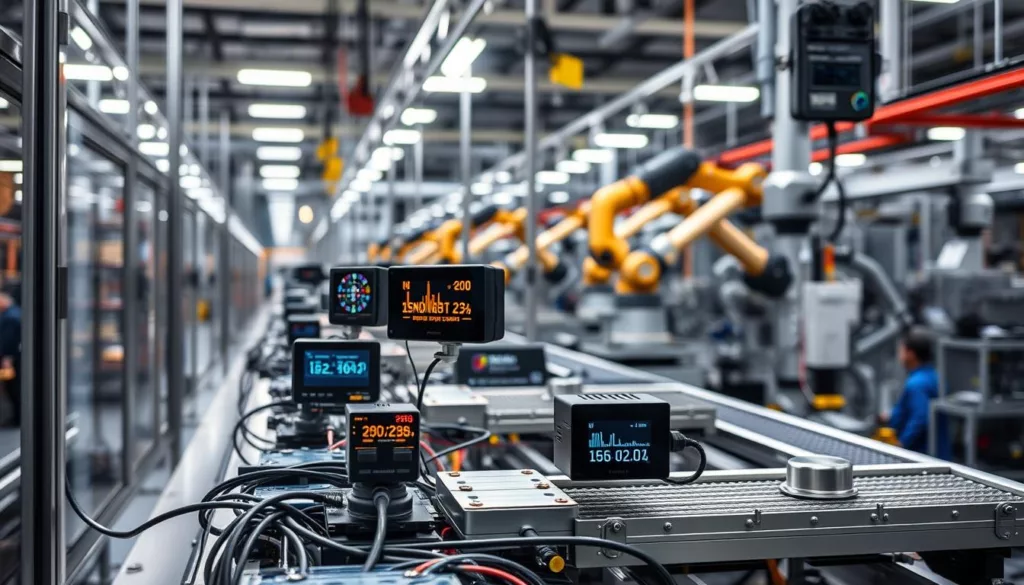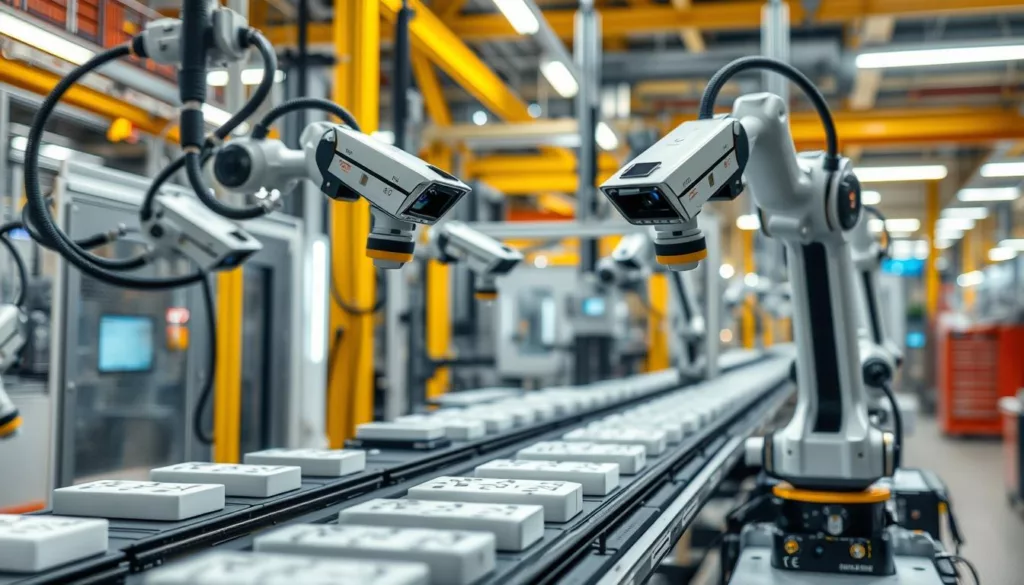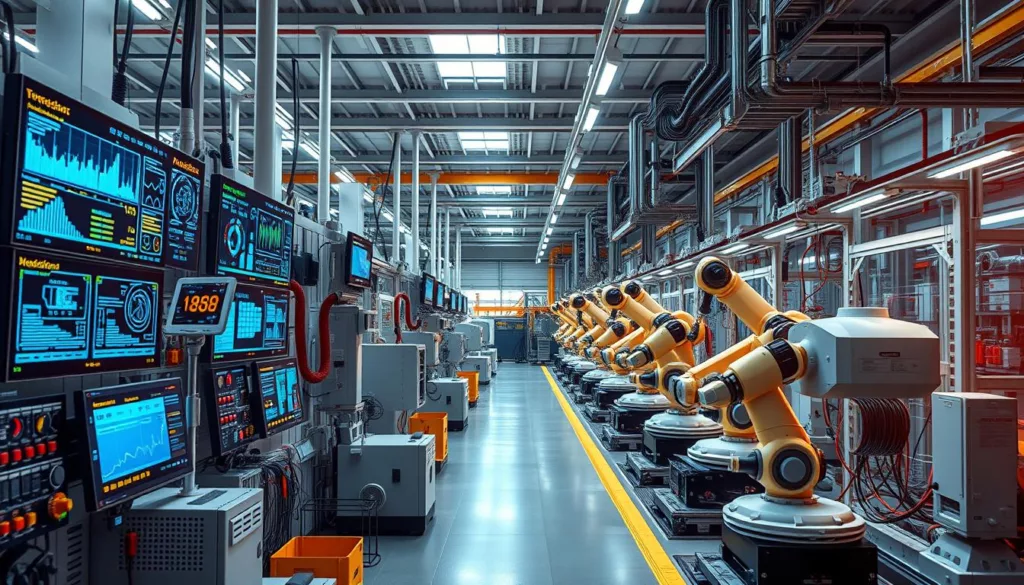Industrial automation sensors are key in changing how we make things today. They use advanced technology to make manufacturing better and more efficient. These sensors help us collect and analyze data in real-time, leading to smarter decisions and less waste.
Using these sensors boosts productivity and helps factories meet growing demands accurately. At XJCSENSOR, we offer top-notch solutions. We’re dedicated to helping you succeed in this new era of manufacturing.
Key Takeaways
- Industrial automation sensors are essential for optimizing manufacturing processes.
- Real-time data analytics leads to improved decision-making and operational efficiency.
- Advanced sensor technology supports improved manufacturing outcomes.
- Efficient production is achievable through strategic sensor integration.
- Our expertise at XJCSENSOR facilitates cutting-edge solutions tailored to industry needs.
Introduction to Industrial Automation Sensors
How do industrial automation sensors improve manufacturing?
Industrial automation sensors are key devices that detect and respond to various conditions in manufacturing. They use different types of sensors to boost productivity and keep quality high. This is important for all operations.
There are many sensor types, like proximity, temperature, and pressure sensors. Each one has its own role and is vital for making workflows better in manufacturing technology. Knowing about these types helps pick the right sensors for specific needs.
At XJCSENSOR, we aim to provide top-notch sensor solutions for modern manufacturing. By adding these sensors to automated systems, we make processes more efficient and reliable. This ensures they meet high standards for the best performance.
The growth of sensor technology has changed the manufacturing world. It allows for real-time data and better system responses. As automation grows, picking the right sensors is more critical than ever.
| Sensor Type | Primary Function | Application Examples |
|---|---|---|
| Proximity Sensors | Detect presence of objects without contact | Robotics, conveyor systems |
| Temperature Sensors | Monitor temperature changes | Ovens, HVAC systems |
| Pressure Sensors | Measure pressure levels in fluids or gases | Hydraulic systems, pneumatic controls |
| Force Sensors | Measure force or load applied | Aerospace, automotive testing |
As we dive deeper into these sensors, we’ll see how they boost productivity and excellence in today’s factories.
Importance of Industrial Sensor Technology
Industrial sensor technology is key for today’s manufacturing. It helps gather important data for better decisions. Using advanced sensors can greatly improve how a company works, making it more efficient.
Businesses can make their processes better in many ways with sensors:
- Reduction of Waste: With accurate data, companies can cut down on waste by better monitoring and control.
- Enhanced Productivity: Sensors give insights to find and fix problems quickly.
- Cost Reduction: Using resources better can lower costs.
Looking into industrial sensor technology shows its big importance. The data from sensors helps improve production and lets engineers and leaders make smart choices for the future.
| Benefit | Description |
|---|---|
| Improved Process Control | Real-time feedback from sensors allows for immediate adjustments, improving production quality. |
| Data-Driven Insights | Analysis of sensor data helps understand trends and patterns for better decision-making. |
| Increased Responsiveness | Manufacturers can quickly adjust to changes in demand or production conditions based on sensor feedback. |
| Predictive Insights | Using data analytics helps predict equipment failures, reducing downtime. |
How do industrial automation sensors improve manufacturing?
Industrial automation sensors are key to changing how we make things. They help companies work better and faster. This means less time waiting and more time making things.
Boosting Efficiency in Automated Manufacturing Processes
Automation is essential today, and sensors make it even better. They help manage tasks that need to be done over and over. This way, companies can:
- Make things faster by streamlining their work.
- Lower mistakes by watching automated systems closely.
- Use resources better with updates on machine status.
Enhancing Accuracy Through Sensor Data Analytics
Using sensor data analytics gives manufacturers useful information. This technology helps them:
- Make better choices with current data.
- Manage stock better with smart predictions.
- Check quality more closely by watching production closely.
XJCSENSOR shows how using sensor data analytics can cut down on waste. It helps use resources better. This mix of sensors and data changes how work is done, making it more efficient and flexible.
Real-Time Process Optimization
Real-time process optimization is key in today’s manufacturing. It helps facilities improve their operations. By using industrial automation sensors, manufacturers can watch their processes closely. This lets them make quick changes when needed.
Benefits of Real-Time Monitoring
Real-time monitoring brings many benefits to companies:
- Proactive Decision-Making: Real-time data helps managers make quick, smart choices.
- Immediate Troubleshooting: Finding and fixing problems fast keeps production running smoothly.
- Enhanced Productivity: Keeping an eye on things ensures everything works well, boosting efficiency.
- Quality Maintenance: Keeping production high is easier with constant checks.
By focusing on real-time optimization, manufacturers can stay ahead. They can solve problems fast and keep quality high.
| Benefit | Description |
|---|---|
| Proactive Decision-Making | Real-time data helps make smart choices to avoid risks. |
| Immediate Troubleshooting | Quickly finding and fixing problems cuts down on downtime. |
| Enhanced Productivity | Real-time insights make processes better, leading to more output. |
| Quality Maintenance | Constant monitoring keeps production standards high and defects low. |
Predictive Maintenance in Manufacturing
In today’s world, predictive maintenance is key to making manufacturing better and more reliable. It uses sensor data to predict when equipment might fail. This way, companies can avoid unexpected downtime and save money on repairs and lost time.
Reducing Downtime with Predictive Analytics
Predictive analytics helps companies check on their equipment’s health. By using data from sensors, they can plan maintenance better. This makes machines work longer and more reliably.
The good things about predictive maintenance are:
- More equipment available
- Less money spent on maintenance
- Operations run smoother
- Everyone stays safer
Also, using predictive analytics tools gives insights into how things are working. It helps spot problems early. This makes the whole manufacturing process better, with less downtime.
| Maintenance Strategy | Benefits | Challenges |
|---|---|---|
| Reactive Maintenance | Low initial costs, basic functional level | High downtime, unexpected failures |
| Preventive Maintenance | Reduced risk of failure, planned downtime | Potential over-maintenance, costs incurred |
| Predictive Maintenance | Optimized resource allocation, minimized downtime | Initial implementation cost, data management complexity |
Using predictive maintenance changes how manufacturing works. It makes operations stronger. As things change, using predictive analytics will become even more important in making things.
Quality Control Monitoring
Quality control monitoring is key to keeping manufacturing processes sound. Industrial automation sensors help by giving exact measurements and feedback in real-time. This ensures quality standards are always met.
Using the latest sensor technology lets manufacturers spot problems early. This is vital for both product quality and keeping operations running smoothly.
The Role of Sensors in Ensuring Quality Production
Sensors in quality control catch defects right away. This means manufacturers can fix issues fast, cutting down on waste. It also helps keep product standards high.
The main perks of using sensors in quality control are:
- Real-time defect detection: Sensors give data fast, so problems can be fixed quickly.
- Consistent data collection: Automated data means less room for human mistakes.
- Enhanced traceability: Sensor tech gives deep insights into how products are made, helping track quality over time.
As the need for top-notch products grows, so does the need for good quality control. Companies using advanced sensors improve their quality and stay ahead in the market.
| Benefit | Description |
|---|---|
| Real-Time Monitoring | Immediate insights into production quality, allowing for instant corrective actions. |
| Reduced Waste | Early detection of errors leads to decreased material waste and operational costs. |
| Improved Customer Satisfaction | High-quality production boosts consumer trust and brand loyalty. |
Machine Vision Inspection Systems
In today’s manufacturing, machine vision systems are key to better quality. They use advanced cameras and sensors for detailed product checks.
Machine vision inspection makes fast, automatic checks on products moving through the line. This visual inspection technology boosts quality control’s accuracy and speed.
Some big benefits of using machine vision systems include:
- Less human error in checks.
- Consistent quality meeting standards.
- Quicker checks mean faster production.
Also, these systems spot defects early, helping meet quality rules. At XJCSENSOR, we help manufacturers use machine vision for better quality and reliability.
| Feature | Benefit |
|---|---|
| High-speed inspection | Speeds up making products |
| Automated data analysis | Better decision-making |
| Consistent monitoring | Less variation in quality |
With a strong machine vision system, industries see big gains in efficiency and quality. This helps them stay ahead in the market.
Integrating Industrial Sensors with Industry 4.0
Adding sensors to Industry 4.0 marks a big leap towards smarter manufacturing. It makes sure information flows smoothly between systems. This leads to better efficiency and quicker responses in operations.
- Real-time data sharing, making it easy to get feedback and make changes right away.
- Autonomous operations, where machines decide on their own based on sensor data, without needing humans.
- Enhanced communication between devices, creating a team-like setting for production tools.
Companies like XJCSENSOR show how to do this well with their advanced sensor solutions. These technologies help manufacturers improve their processes. They also keep them ahead in a fast-changing market.
Conclusion
Industrial automation sensors are key to making manufacturing more efficient. They help monitor things in real time, predict when maintenance is needed, and check product quality. These are all important for keeping operations running smoothly.
As technology keeps changing, using new sensor solutions will become more important. This will help manufacturing processes work better and more effectively.
XJCSENSOR leads in providing custom sensor solutions for our clients. We help them use the latest sensor technology. This way, industries can improve their operations and stay ahead in the market.
Using industrial automation sensors improves production and sets the stage for more efficiency. Looking ahead, these advanced technologies will help manufacturers innovate and succeed.

